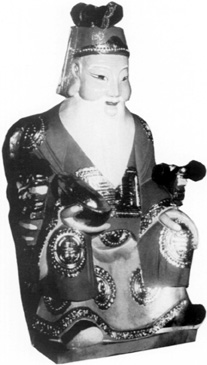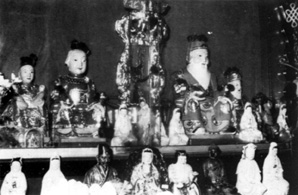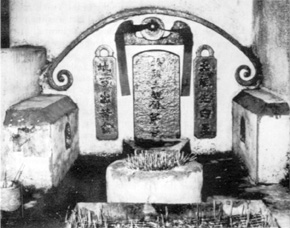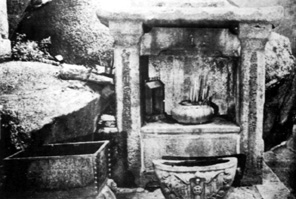
The second day of the second lunar month is dedicated to the T'u-Ti gods. The literal translation of T'u-Ti is Soil-Earth and the term is used to describe the local Gods of the Earth. These gods originated in the Chou Dynasty (1122-255 B.C.) When the worship of Heaven and Earth became the privilege of the Son of Heaven. The common people, however, could not get used to the new beliefs and they continued to worship the Earth in its symbolic form of the Five Terrestrial Spirits represented by the Earth and Maize. The Earth Sovereign thus remained part of the popular belief but his importance was reduced to the specific area where man could build his home and carry out his farming activities. Maize was the symbol of the Earth's generosity towards man. The Emperor worshipped the Earth Sovereign as T'ien-Hsia-She (the Terraqueous Quadrant under the Heavens), all the land contained by the Four Seas which made up the Middle Kingdom and the barbarian countries which surrounded it. The common people worshipped the Earth Sovereign by the name of Li-She, god of the little plot of land where they carried out their day to day existence. The Emperor sacrificed an ox to this god in the name of the empire; the common people offered him delicacies from the land in thanks for benefits received.
As time went on, the Gods of the Soil were increasingly represented by human beings. In theory, anyone could be chosen for this honoured position after death. Usually, however, those people who were chosen had distinguished themselves by some heroic deed or by having been of great service to the community and it was hoped that by making them gods they would continue in the same vein in the afterlife. If they did not fulfill their duties as gods in a satisfactory manner, they could be deposed and someone else named in their place. It was not uncommon for the people to choose some famous outlaw to take the place of a god who had been deposed for neglecting his duties.
Various names are given to the Gods of the Soil such as T'u-Shen (Spirits of the Earth), T'u-Ti Shen (Spirits of the Soil and the Earth), T'u-Ti-P'u-Sa (Gods of the Earth and the Soil), Gods of the Earth and the Maize, Gods of the Earth and the Harvest and so on. In the South of China, people simply call them T'u-Ti-Kung and in the North they are called T'u-Ti-Lao-Yeh. They are divided into five groups corresponding to the five cardinal points: the Green T'u-Ti God protects the East; the Red God protects the South; the White God, the West; the Black God, the North, and the Yellow God the Centre. As a group they are called Wu-Fang-T'u-Ti-Shen, that is, the Terrestrial Gods of the Five Cardinal Points. They are represented by the Five Dragons which hold up the Earth and which move when they tire of the weight, causing earthquakes and seismic faults.
The T'u-Ti gods have very limited powers of jurisdiction especially in areas where villages are located close to each other. Moreover, each village is divided into five sections with each god reigning over one section. Consequently, the T'u-Ti god of the East has no power in the western section and vice versa.
They are, nevertheless, believed to be extremely powerful within their own area. They protect their community from demons and malign spirits, infestations, plagues and other natural disasters. In rural areas they chase away lost souls and destroy the plagues which damage seedlings thus guaranteeing an abundant harvest. They take care of domestic birds and animals and make sure that they are fat and fertile.
In the event of a drought or flood, the people take a statue of the god to a point where he can survey the surrounding land and be made fully aware of the situation. The people believe that in this way the gods are forced to deal with the catastrophes which affect their area.
The people always call on these gods in their hour of need and pay them a lot of attention. Thus there are many temples and altars at the entrances to villages, at the roadside, on the banks of canals, rivers and lakes, and in cities they can be found almost anywhere.
As a general rule, the temples are small and measure only one or one and a half metres across. Inside there are little statues of the T'u-Ti god and goddess: in cities they are shown as city-dwellers and in the country they are peasants. The reason for the minimal size of these temples is explained in the following legend.
A mandarin called Mr. Li had five sons. His wife was very devoted to the T'u-Ti god but he believed in no idols. One day, his eldest son fell ill and that same night Mr. Li dreamt that a T'u-Ti god told him that should he continue a disbeliever, his son would die. Mr. Li replied that if this was Heaven's desire then his son would have to die. And so the boy died. He was followed by another three brothers. When the fifth son fell ill, the god appeared in Mr. Li's dreams again saying that if he persisted in not worshipping him, he would also lose his last son. The mandarin replied that this son would not die and, in view of the fact that the god was responsible for the death of the other four sons, he intended to destroy all the temples dedicated to him. And so he did. Some days later, the god appeared to him again in his dreams and, in an attitude of atonement confessed that the boys had died because of a decision made in Heaven and that what he had said had only been to win him over as a worshipper.
He closed by begging Mr. Li to rebuild the temples he had destroyed. The mandarin gave in to the god's request and promised to build him "she-chi" (arrow-temples).
The god was greatly cheered by the thought that temples stretching the distance covered by an arrow in flight would be built in his honour. However, the mandarin took his revenge on the god by building him temples the length of one arrow. From that time on, all the temples dedicated to this god throughout the empire were the same size. There was only one exception - the majestic temple inside the Forbidden City in Peking.
The altars dedicated to this god in rural areas are square (the traditional shape of objects associated with the worship of the Earth). They have no roof and are always surrounded by trees. The T'u-Ti god is almost always represented by a rough, jagged stone no more than one and a half metres high. Sometimes there are five stones representing the Five Spirits which reign over the Five Cardinal Points or the Five Dragons which personify this divinity. Peasants seeking the protection of these gods go to the temples and dedicate offerings, prayers and incense to them.
In addition to the temples which are found in public, every Chinese home has its own T'u-Ti god to protect the house and the area in which it is located. The god is represented by a rectangular piece of red paper with the Chinese characters indicating the god's name pinned onto a niche at ground level near the front door.
The custom of putting the statue of the T'u-Ti god on the ground arose during the Ming Dynasty. It is said that once, when Emperor T'ai-Tsu (1368-1399) was travelling in disguise on an inspection of the military posts in his recently established empire, he went into an inn one night for a meal. All the tables were occupied with the exception of one on which the statue of the T'u-Ti god was standing. Somewhat bothered by this, the emperor placed the statue on the ground, saying "Excuse me, please give me your place". Later, when he had finished dinner he put the statue back on the table which served as an altar.
That same night, the god appeared to the innkeeper in a dream and told him that even though he was a god he did not want to cross the emperor again and for this reason he begged the innkeeper to leave his statue on the ground forever. News of this astonishing deed spread through the empire like wildfire and the devotees of the god, in their desire to please him, immediately put his statue on the floor. From that time on, the statue of the T'u-Ti god has never been put on a table.
It is said that the T'u-Ti gods make a note of everything which happens in the neighbourhood and in each home and they report back to the Ch'eng-Huang (the God of the Walls and Ditches). In turn, this god reports to the King of Hell for him to write it all down in the Book of Life and Death. These reports are used to decide the rewards or punishments to be received by the souls of the dead once they enter the afterlife. To ingratiate themselves and receive protection from the T'u-Ti gods, believers often give them sacrifices and offerings on the second day of the second month which is the main festival for this divinity. They also give him offerings on the first day of the first five months of the lunar year in honour of the Five Spirits which he represents. In addition to the festivals shown on the calendar, each locality has its own festival for celebrating its own T'u-Ti god.
The T'u-Ti gods are different from the She gods or the She-Chi gods in so far as the extent of their powers. They control a neighbourhood of around twenty five to one hundred families while the She gods are responsible for an area of around two and a half thousand to five thousand households and, in some cases, a whole prefecture.
The Ch'eng-Huang (Gods of the Walls and Ditches) are the highest category of T'u-Ti gods They are the guardian gods for walled cities as well as the territories under the jurisdiction of the government magistrates resident in them. The T'u-Ti gods within the perimeter of this area are also under their control.
The following are some of the most famous T'u-Ti gods to be found in classical literature: Kou-Lung from the period of the mythical emperor Fu-Hsi (2953-2838 B.C.), deposed and reinstated as a god on several occasions; Chiang-Tsu-Wen from the end of the Han Dynasty; Shen-Yueh from the Ch'i and Liang Dynasties; Yo-Fei from the Sung Dynasty; T'ai-Tsu founder of the Ming Dynasty who caused the statues to be put on the ground; and Ch'un-Shen-Chun who, having taken over from Ch'eng Huang was deposed and dismissed.

1 T'ou Tei and his wife - an altar dedicated to the guardian spirits of the earth.
(Temple for worshipping gods of the earth and the soil in Macau)
The twenty first day of the fifth lunar month is the festival of the Ch'eng-Huang, God of the Walls and Ditches, Patron God of the City, the Celestial Mandarin in view of the fact that he fulfills the duties of protecting and governing the city of which he is guardian god.
This divinity is only found and worshipped in the capitals of administrative boundaries, that is in walled cities. Hence the origin of their name.
In ancient China, every city or town of strategic importance was surrounded by a "ch'eng" or wall usually composed of two sections: the outside wall built of huge slabs of stone or bricks, and an empty inner section filled with earth. This is dug near the outside wall and, as the earth is excavated, a ditch is formed running parallel to the wall.
As the wall and the ditch each have a spirit to protect them and reside in them, the inhabitants of the walled cities made them into gods in gratitude for the protection and benefits which they had received from them. As time went on, these two spirits came to be treated as a single god represented by one statue and called Ch'eng-Huang.
Popular belief is that the magistrate governs the people who live in the city and protects the city from visible dangers and enemies while the Ch'eng-Huang governs the dead and protects the city from invisible enemies and evil influences. The former is believed to be "yang" and the latter "yin" and they both have equal administrative rights.
In imperial times, they were both responsible for peace and order in the city and the wellbeing and prosperity of the inhabitants over whom they governed. They shared responsibility and when the magistrate encountered some problem which he could not solve, he would go the Ch'eng-Huang to ask his advice and help. In order to do this, he would fast for at least a day, then he would offer up a sacrifice to the god and finally he slept for one night in the temple. The dream which he had during that night would inspire him to reach a verdict.
In addition to being co-governor of the city and the magistrate's adviser, Ch'eng-Huang had several other duties as he was responsible for all the demons and evil spirits to be found within the limits of the city. He had to persuade them to leave the region free from floods and droughts. To do this, whenever a nearby town was suffering from a lack of rain or some other disaster, the statue of the god was taken out on procession and paraded through the streets and squares with great ceremony so that the god himself could see what was needed and offer rapid assistance. The people also begged him to assist them in defeating any enemies and getting rid of plagues and epidemics. In other words, Ch'eng-Huang's assistance was sought in the event of any public or private mishap.
Ch'eng-Huang was worshipped in all the cities throughout the empire as the guardian divinity. Only a tiny number of cities had other divinities protecting them, among them Shanghai, and Hangchou, capital of Chekiang Province which adopted the god Chou-Hsin as its guardian divinity.

2 Altar for worshipping T'ou Tei or T'u-Ti.

3 Altar to T'ou Tei with carved stone incense burners.
(A Ma Temple, Macau)
There are several versions telling the story of the origin of the cult of Ch'eng-Huang. Some give the origin as being related to the sacrifices made in honour of the Pa-Cha (the eight spirits which can protect or damage harvests) established by Emperor Yao (2357-2255 B.C.). The seventh of these spirits, Shui-Yang, was the guardian of dykes and dams and he was later named Ch'eng-Huang. Other versions say that, in the beginning, the T'u-Ti gods lived in the soil and that the cult of Ch'eng-Huang only developed much later towards the end of the feudal period when the empire was split up and there were constant wars. At this time, walls and ditches were built around the cities in order to protect and defend them.
It was also during this time that Ch'eng-Huang started to be represented by human beings who had gained divine status, heroes and heroines of immeasurable excellency and citizens who had served and protected the people selflessly. On their death, these people were nominated the Ch'eng-Huang of such and such a place so that they would continue to protect the inhabitants. Although sacred Taoist books tell us that the election of a Ch'eng-Huang was the responsibility of the Yu-Huang, the Venerable Jade Lord, in actual fact it is the people who choose him from amongst the most illustrious and generous inhabitants who have passed on to the next life. There are, nevertheless, occasions in which some outlaw or revolutionary has been chosen for this honoured position by popular acclaim.
Several emperors have honoured many Ch'eng-Huang with the title of Wang (king), Kung (duke), Hou (marquis) or Po (count) for services lent to the empire.
The Ch'eng-Huang festival takes place each year on the twenty first day of the fifth lunar month and the anniversary of the god is on the twenty fifth day of the ninth month. Offerings and sacrifices are made and there are processions and dramas. During the Lunar New Year festivities, this god is also celebrated as is the case in Ching-Ming and all the new moons and full moons throughout the year.
The Ch'eng-Huang is represented with a white beard with his dress varying depending on the locality in which he is god. If he is in a capital city, he wears the clothes of a mandarin, and if it is a less important town he wears the clothes of the average man in the street. He always has his wife next to him. She is of advanced years as are his closest assistants. Pai-Lao-Yeh (the White Lord) and Heo-Lao-Yeh (the Black Lord) are responsible for informing him of everything which takes place within his territory during the day and the night respectively. Niu-T'ao (Ox Head) and Ma-Mien (Horse Face) are responsible for tearing the souls out of the bodies of the dying and taking them to him to check their identity and the exact moment in which they should die according to the Book of Life and Death. The Ch'eng-Huang weighs up their good and bad actions, passes judgement and reports back to the judge of the first hell for him to confirm the sentence and send them to the correct torture chamber for them to pay penance for their misdeeds.
The Ch'eng-Huang is supposed to take special care of the K'u-Kuei, the hungry spirits who have no descendants to worship them and offer them sacrifices. On the fifteenth day of the seventh month, during the festival of the wandering spirits, a statue of the divinity is paraded through the streets of the city to bring them into line while the people offer them food and burn paper clothing and in-pou (paper replicas of gold and silver ingots.)
The Ch'eng-Huang is also taken out on a parade during the festivals of Ch'ing-Ming (Pure Light) and Pai-Sou (first day of the tenth month) both of which are festivals dedicated to appease the souls of the dead.
*Sinologist with extensive knowledge about Chinese culture, the result of a thirty-year stay in a Chinese village and twelve years in Macau. He contributes articles on culture to some Mexican weeklies and has recently published essays, poems and translations of Chinese literature.
start p. 60
end p.